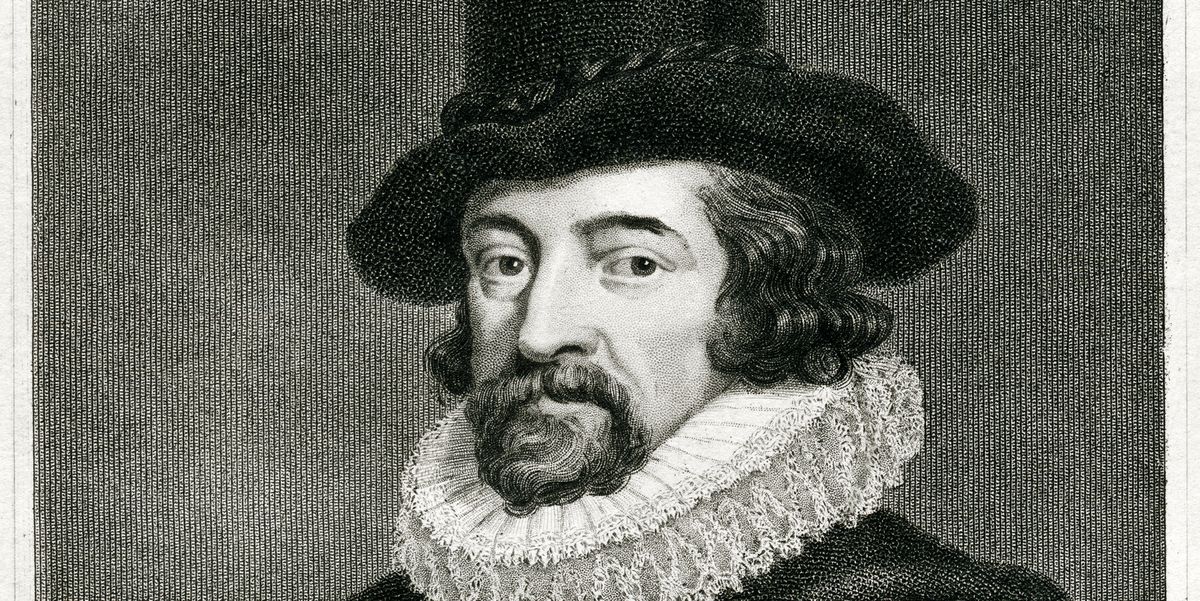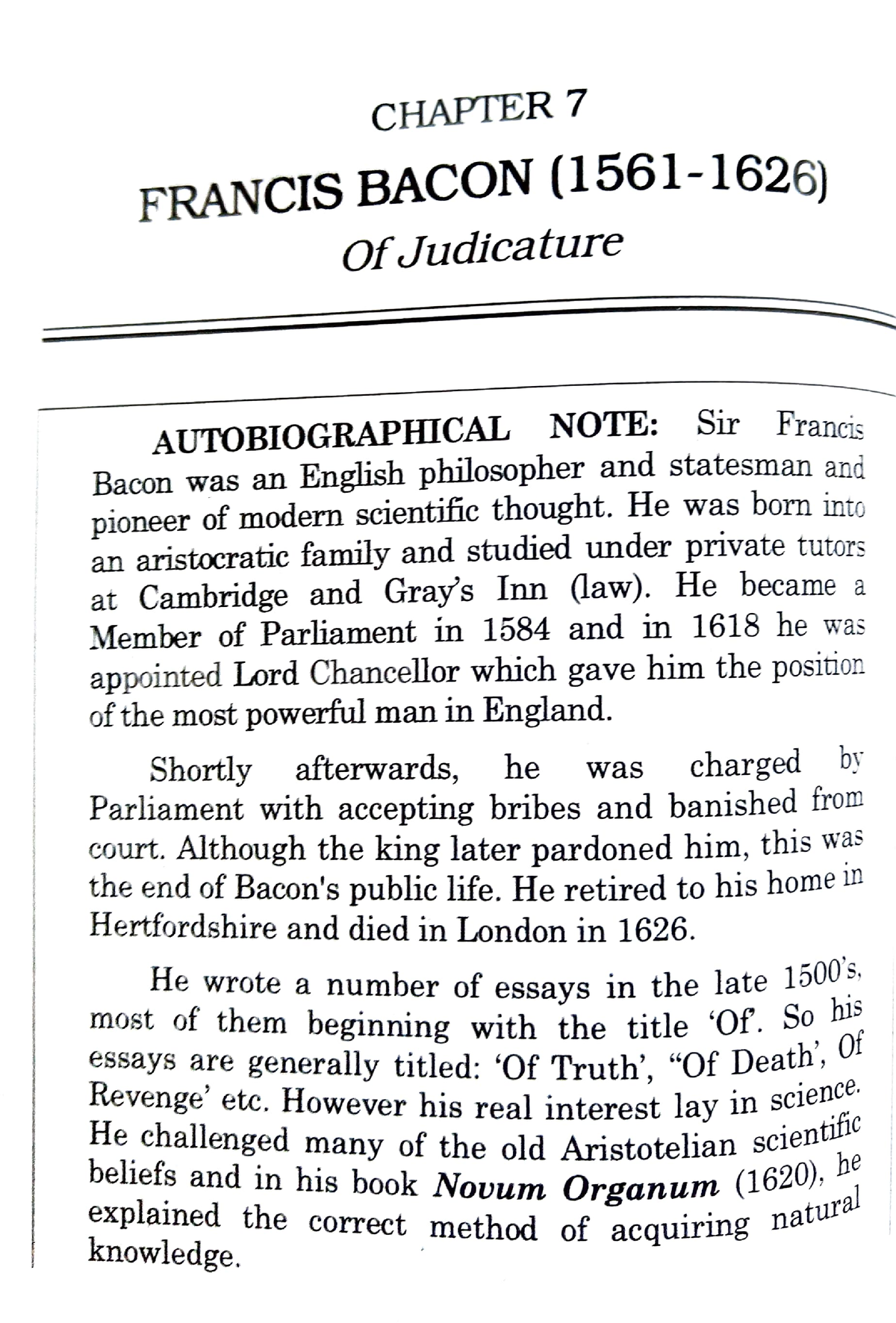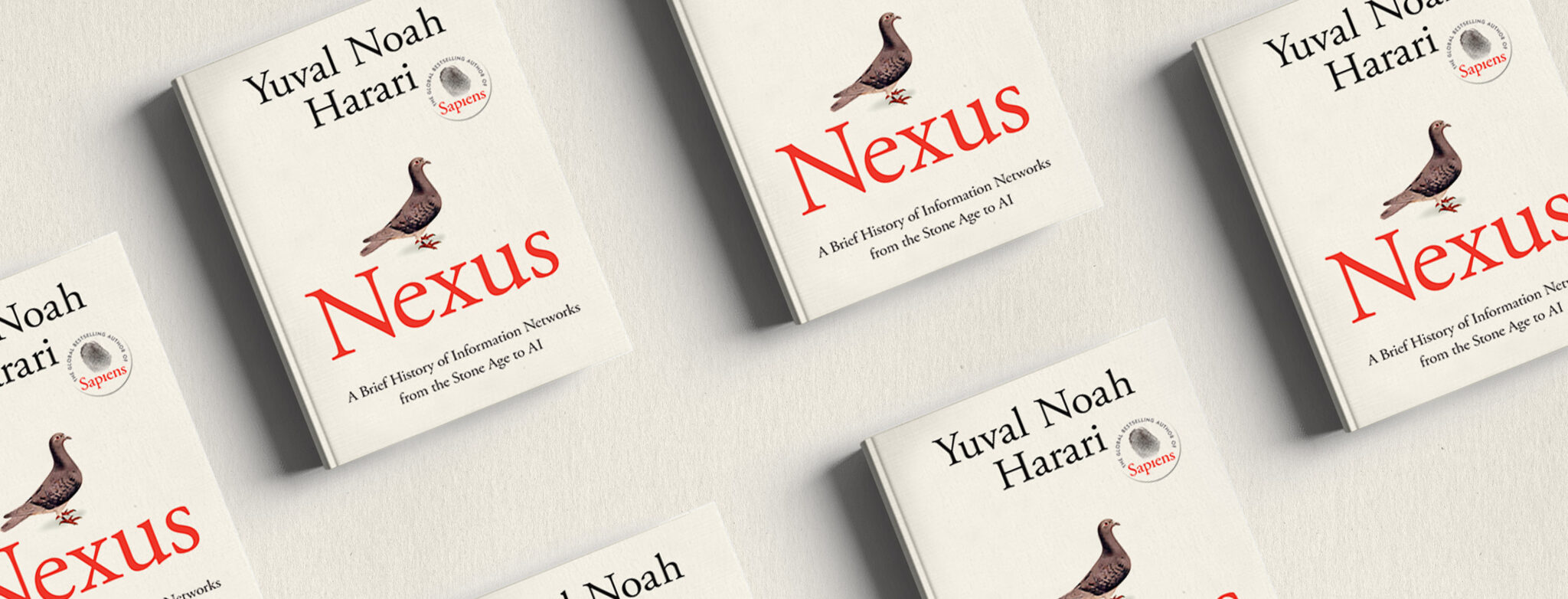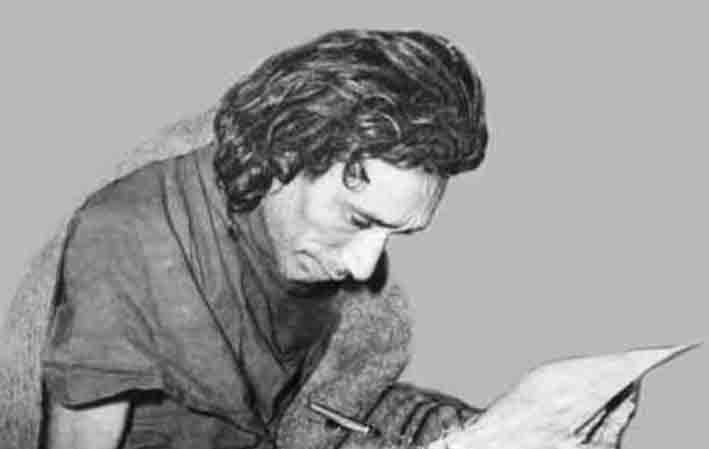Want to create or adapt books like this? Learn more about how Pressbooks supports open publishing practices.

51 Francis Bacon: Essays
Introduction.
by Mary Larivee and Rithvik Saravanan
Francis Bacon (1561-1626), the English philosopher, was instrumental in the development of the Scientific Revolution in the late 18th century even though he had passed away centuries before. The “Scientific Revolution” was an important movement that emphasized Europe’s shift toward modernized science in fields such as mathematics, physics, astronomy, biology, and chemistry (Grant). It was an extension of the Renaissance period, which then led to the Enlightenment which brought advances across all areas of human endeavor. Francis Bacon, in particular, is remembered today primarily for the “scientific method” as a way of establishing what is true from what is false perception (a method that still lies at the heart of modern science). Bacon’s primary focus in his writings revolved around the practice of inductive reasoning, which he believed to be a complement to practical observation (Grant). Most people before this period followed the Aristotelian methodology for scientific arguments. This idea maintained that “if sufficiently clever men discussed a subject long enough, the truth would eventually be discovered” (“History – Francis Bacon.”). However irrational this sounds, the Scientific Revolution helped replace this outdated system of thinking with Bacon’s scientific method. Bacon argued that any proper argument required “evidence from the real world” (“History – Francis Bacon.”). His revolutionary ideas about empirical information helped propel him toward political and societal importance and fame.
Literary Context
Francis Bacon had a passion for metaphors, analogies, and vivid imagery. He was a rhetorical writer and his essays highlight his wisdom and incisive mind. His first book was released in 1597 followed by later editions with added essays that were released in 1612 and 1625. Each essay that Bacon wrote reveals his knowledge of Latin and draws on ancient Roman wisdom through axioms and proverbs. Additionally, Bacon uses wit as a way of getting his point across to his audience and this indeed causes the reader to reflect on his or her own beliefs and values. A key aspect of Bacon’s literature is its “terseness and epigrammatic force” (De). By managing to pack all of his thoughts and ideas into quick, brief statements, Bacon deepens the reach and impact of his work. His writing deviated from the typical Ciceronian style of the time, which was characterized by “melodious language, clarity, and forcefulness of presentation” (“Ciceronian.”). His statements are meaningful particularly because they are straight and to the point. The brevity of his ideas also facilitates the communication of his arguments, which is significant because, at the time, a solid, meaningful education was hard to come by. As such, Bacon’s work helped spread the notions that would eventually bear fruit with the discoveries of the Scientific Revolution.
Historical Context
Francis Bacon’s Essays cover a wide variety of topics and styles, ranging from individual to societal issues and from commonplace to existential. Another important aspect of the appeal of Bacon’s essays are that they weigh the argument at hand with multiple points of view. Bacon’s essays were received at the time with great praise, adoration, and reverence (Potter). He was noted for borrowing ideas from the works of historical writers such as Aristotle (Harmon), and, as such, he represents a continuation of this philosophical school of thought. Another important impact of the Scientific Revolution and Bacon’s literature is that it allowed common people of the era to question old, traditional beliefs. They began to consider everything with reason, which led to a greater sense of self as well as moral and ethical standards. By having the opportunity to judge for themselves, the people were able to advance society a step closer to a form of democracy.
Francis Bacon Essays is a collection of eight of the famous philosopher’s many essays. Each dissertation contains words of wisdom that have proven to be enlightening for many generations that followed. From “Truth” to “Of Superstition” and “Marriage and Single Life”, Bacon covers a wide range of intriguing topics in order to challenge the human mind to think deeply; as he himself writes: “Read not to contradict and confute, nor to believe and take for granted, nor to find talk and discourse, but to weigh and consider” (Bacon). The philosopher not only provides a framework for the genre of the modern essay but also provides his readers a code to live by.
Works Cited
“Ciceronian.” Dictionary.com , n.d., www.dictionary.com/browse/ciceronian. 23 Oct. 2020.
De, Ardhendu. “Rhetorical Devices as Used by Francis Bacon in His Essays.” A.D.’s English Literature: Notes and Guide , 07 Apr. 2011, ardhendude.blogspot.com/2011/04/rhetorical-devices-used-by-francis.html. Accessed 23 Oct. 2020.
Grant, Edward. The Foundations of Modern Science in the Middle Ages: Their Religious, Institutional, and Intellectual Contexts . Cambridge University Press, 1996.
Harmon, William. The Oxford Book of American Light Verse. Oxford University Press, 1979.
“History – Francis Bacon.” History , British Broadcasting Corporation, 2014, www.bbc.co.uk/history/historic_figures/bacon_francis.shtml. Accessed 24 Oct. 2020.
Potter, Vincent G. Readings in Epistemology: from Aquinas, Bacon, Galileo, Descartes, Locke, Berkeley, Hume, Kant. Fordham University Press, 1993.
Discussion Questions
- Why do you think Francis Bacon chose to enlighten and inspire his readers as opposed to other writers of his time who focused more on classic folklore tales?
- Why do you think Francis Bacon choose the topics that he did? Who or what do you think had a major influence on his writings?
- What are the goals and intentions behind Bacon’s use of rhetorical questioning?
- What are some common themes and ideas from Francis Bacon’s Essays that can be applied to general situations and contemporary society?
- From the ideas presented in this reading, how do you think Francis Bacon’s work affected government policies throughout history, including modern day governmental standards?
Further Resources
- Detailed biography of Franics Bacon’s life
- Analytical article of Francis Bacon’s impact on the Scientific Revolution
- List of Francis Bacon’s most significant accomplishments
- Compilation of Francis Bacon’s literature
- Stanford Encyclopedia of Philosophy entry on Francis Bacon
- Discussion video of Francis Bacon’s “Of Studies”
Reading: From Essayes
I. of truth..
What is truth? said jesting Pilate; and would not stay for an answer. Certainly there be that delight in giddiness; and count it a bondage to fix a belief; affecting free-will in thinking, as well as in acting. And though the sects of philosophers of that kind be gone, yet there remain certain discoursive wits, which are of the same veins, though there be not so much blood in them as was in those of the ancients. But it is not only the difficulty and labour which men take in finding out of truth, nor again, that when it is found, it imposeth upon men’s thoughts, that doth bring lies in favour, but a natural though corrupt love of the lie itself. One of the later schools of the Grecians examineth the matter, and is at a stand to think what should be in it, that men should love lies; where neither they make for pleasure, as with poet; nor for advantage, as with the mer chant, but for the lie’s sake. But I cannot tell: this same truth is a naked and open daylight, that doth not show the masks, and mummeries, and triumphs of the world, half so stately and daintily as candlelights. Truth may perhaps come to the price of a pearl, that showeth best by day, but it will not rise to the price of a diamond or carbuncle, that showeth best in varied lights. A mixture of a lie doth ever add pleasure. Doth any man doubt, that if there were taken out of men’s minds, vain opinions, flattering hopes, false valuations, imaginations as one would, and the like, but it would leave the minds of a number of men, poor shrunken things, full of melancholy and indisposition, and unpleasing to themselves? One of the fathers, in great severity, called poesy “vinum dæmonum,”; because it filleth the imagination, and yet it is but with the shadow of a lie. But it is not the lie that passeth through the mind, but the lie that sinketh in, and settleth in it, that doth the hurt, such as we spake of before. But howsoever these things are thus in men’s depraved judgments and affections, yet truth, which only doth judge itself, teacheth, that the inquiry of truth, which is the love-making, or wooing of it, the knowledge of truth, which is the presence of it, and the belief of truth, which is the enjoying of it, is the sovereign good of human nature. The first creature of God, in the works of the days, was the light of the sense: the last was the light of reason; and his Sabbath work ever since, is the illumination of his Spirit. First, he breathed light upon the face of the matter, or chaos; then he breathed light into the face of man; and still he breatheth and inspireth light into the face of his chosen. The poet that beautified the sect, that was otherwise inferior to the rest, saith yet excellently well: “It is a pleasure to stand upon the shore, and to see ships tossed upon the sea: a pleasure to stand in the window of a castle, and to see a battle, and the adventures thereof below: but no pleasure is comparable to the standing upon the vantage ground of truth, (a hill not to be commanded, and where the air is always clear and serene,) and to see the errors, and wanderings, and mists, and tempests in the vale below:” so always that this prospect be with pity, and not with swelling or pride. Certainly, it is heaven upon earth, to have a man’s mind move in charity, rest in providence, and turn upon the poles of truth.
To pass from theological and philosophical truth, to the truth of civil business; it will be acknowledged even by those that practise it not, that clean and round dealing is the honour of man’s nature, and that mixture of falsehood is like alloy in coin of gold and silver, which may make the metal work the better, but it embaseth it. For these winding and crooked courses are the goings of the serpent; which goeth basely upon the belly, and not upon the feet. There is no vice that doth so cover a man with shame as to be found false and perfidious; and therefore Montaigne saith prettily, when he inquired the reason, why the word of the lie should be such a disgrace, and such an odious charge, saith he, “If it be well weighed, to say that a man lieth, is as much as to say, that he is brave towards God, and a coward towards men. For a lie faces God, and shrinks from man.” Surely the wickedness of falsehood and breach of faith cannot possibly be so highly expressed, as in that it shall be the last peal to call the judgments of God upon the generations of men: it being foretold, that when “Christ cometh,” he shall not “find faith upon the earth.”
VIII. OF MARRIAGE AND SINGLE LIFE.
He that hath wife and children hath given hostages to fortune; for they are impediments to great enterprises, either of virtue or mischief. Certainly the best works, and of greatest merit for the public, have proceeded from the unmarried or childless men; which, both in affection and means, have married and endowed the public. Yet it were great reason that those that have children should have greatest care of future times, unto which they know they must transmit their dearest pledges. Some there are, who, though they lead a single life, yet their thoughts do end with themselves, and account future times impertinences; nay, there are some other that account wife and children but as bills of charges; nay more, there are some foolish rich covetous men, that take a pride in having no children, because they may be thought so much the richer; for, perhaps, they have heard some talk, “Such an one’s a great rich man” and another except to it. “Yea, but he hath a great charge of children;” as if it were an abatement to his riches: but the most ordinary cause of a single life is liberty, especially in certain self-pleasing and humorous minds, which are so sensible of every restraint, as they will go near to think heir girdles and garters to be bonds and shackles. Unmarried men are best friends, best masters, best servants; but not always best subjects; for they are light to run away; and almost all fugitives are of that condition. A single life doth well with churchmen, for charity will hardly water the ground where it must first fill a pool. It is indifferent for judges and magistrates; for if they be facile and corrupt, you shall have a servant five times worse than a wife. For soldiers, I find the generals commonly, in their hortatives, put men in mind of their wives and children; and I think the despising of marriage among the Turks maketh the vulgar soldier more base. Certainly wife and children are a kind of discipline of humanity; and single men, though they may be many times more charitable, because their means are less exhaust, yet, on the other side, they are more cruel and hardhearted, (good to make severe inquisitors,) because their tenderness is not so oft called upon. Grave natures, led by custom, and therefore constant, are commonly loving husbands, as was said of Ulysses, “vetulam suam prætulit immortalitati.” Chaste women are often proud and froward, as presuming upon the merit of their chastity. It is one of the best bonds, both of chastity and obedience, in the wife, if she think her husband wise; which she will never do if she find him jealous. Wives are young men’s mistresses, companions for middle age, and old men’s nurses; so as a man may have a quarrel to marry when he will: but yet he was reputed one of the wise men, that made answer to the question when a man should marry:—”A young man not yet, an elder man not at all.” It is often seen, that bad husbands have very good wives; whether it be that it raiseth the price of their husband’s kindness when it comes, or that the wives take a pride in their patience; but this never fails, if the bad husbands were of their own choosing, against their friends consent, for then they will be sure to make good their own folly.
XI. OF GREAT PLACE.
Men in great place are thrice servants; servants of the sovereign or state, servants of fame, and servants of business; so as they have no freedom, neither in their persons, nor in their actions, nor in their times. It is a strange desire to seek power and to lose liberty; or to seek power over others, and to lose power over a man’s self. The rising unto place is laborious, and by pains men come to greater pains; and it is sometimes base, and by indignities men come to dignities. The standing is slippery, and the regress is either a downfall, or at least an eclipse, which is a melancholy thing: “Cum non sis qui fueris, non esse cur velis vivere.” Nay, retire men cannot when they would, neither will they when it were reason; but are impatient of privateness even in age and sickness, which require the shadow: like old townsmen, that will be still sitting at their street door, though thereby they offer age to scorn. Certainly great persons had need to borrow other men’s opinions to think themselves happy; for if they judge by their own feeling, they cannot find it: but if they think with themselves what other men think of them, and that other men would fain be as they are, then they are happy as it were by report, when, perhaps, they find the contrary within; for they are the first that find their own griefs, though they be the last that find their own faults. Certainly men in great fortunes are strangers to themselves, and while they are in the puzzle of business they have no time to tend their health either of body or mind: “Illi mors gravis incubat, qui notus nimis omnibus, ignotus moritur sibi.” In place there is license to do good and evil; whereof the latter is a curse: for in evil the best condition is not to will; the second not to can. But power to do good is the true and lawful end of aspiring; for good thoughts (though God accept them,) yet towards men are little better than good dreams, except they be put in act; and that cannot be without power and place, as the vantage and commanding ground. Merit and good works is the end of man’s motion; and conscience of the same is the accomplishment of man’s rest; for if a man can be partaker of God’s theatre, he shall likewise be partaker of God’s rest: “Et conversus Deus, ut aspiceret opera, quaæ fecerunt manus suæ, vidit quod omnia essent bona nimis;” and then the sabbath. In the discharge of the place set before thee the best examples; for imitation is a globe of precepts; and after a time set before thine own example; and examine thyself strictly whether thou didst not best at first. Neglect not also the examples of those that have carried themselves ill in the same place; not to set off thyself by taxing their memory, but to direct thyself what to avoid. Reform, therefore, without bravery or scandal of former times and persons; but yet set it down to thyself, as well to create good precedents as to follow them. Reduce things to the first institution, and observe wherein and how they have degenerated; but yet ask counsel of both times; of the ancienter time what is best; and of the latter time what is fittest. Seek to make thy course regular, that men may know be forehand what they may expect; but be not too positive and peremptory; and express thyself well when thou digressest from thy lure. Preserve the right of thy place, but stir not questions of jurisdiction; and rather assume thy right in silence, and “de facto,” than voice it with claims and challenges. Preserve likewise the rights of inferior places; and think it more honour to direct in chief than to be busy in all. Embrace and invite helps and advices touching the execution of thy place; and do not drive away such as bring thee information as meddlers, but accept of them in good part. The vices of authority are chiefly four; delays, corruption, roughness, and facility. For delays give easy access: keep times appointed; go through with that which is in hand, and interlace not business but of necessity. For corruption, do not only bind thine own hands or thy servant’s hands from taking, but bind the hands of suitors also from offering; for integrity used doth the one; but integrity professed, and with a manifest detestation of bribery, doth the other; and avoid not only the fault, but the suspicion. Whosoever is found variable, and changeth manifestly without manifest cause, giveth suspicion of corruption; therefore, always when thou changest thine opinion or course, profess it plainly, and declare it, together with the reasons that move thee to change, and do not think to steal it. A servant or a favourite, if he be inward, and no other apparent cause of esteem, is commonly thought but a by-way to close corruption. For roughness, it is a needless cause of discontent; severity breedeth fear, but roughness breedeth hate. Even reproofs from authority ought to be grave, and not taunting. As for facility, it is worse than bribery; for bribes come but now and then; but if importunity or idle respects lead a man, he shall never be without; as Solomon saith, “To respect persons is not good, for such a man will transgress for a piece of bread.” It is most true that was anciently spoken, “A place showeth the man; and it showeth some to the better and some to the worse;” “omnium consensu capax imperii, nisi imperasset,” saith Tacitus of Galba; but of Vespasian he saith, “solus imperantium, Vespasianus mutatus in melius;” though the one was meant of sufficiency, the other of manners and affection. It is an assured sign of a worthy and generous spirit, whom honour amends; for honour is, or should be, the place of virtue; and as in nature things move violently to their place and calmly in their place, so virtue in ambition is violent, in authority settled and calm. All rising to great place is by a winding stair; and if there be factions, it is good to side a man’s self whilst he is in the rising, and to balance himself when he is placed. Use the memory of thy predecessor fairly and tenderly; for if thou dost not, it is a debt will sure be paid when thou art gone. If thou have colleagues, respect them; and rather call them when they looked not for it, than exclude them when they have reason to look to be called. Be not too sensible or too remembering of thy place in conversation and private answers to suitors; but let it rather be said, “When he sits in place he is another man.”
XVII. OF SUPERSTITION.
It were better to have no opinion of God at all than such an opinion as is unworthy of him; for the one is unbelief, the other is contumely; and certainly superstition is the reproach of the Deity. Plutarch saith well to that purpose: “Surely,” saith he, “I had rather a great deal men should say there was no such man at all as Plutarch, than that they should say that there was one Plutarch, that would eat his children as soon as they were born:” as the poets speak of Saturn: and, as the contumely is greater towards God, so the danger is greater towards men. Atheism leaves a man to sense, to philosophy, to natural piety, to laws, to reputation: all which may be guides to an outward moral virtue, though religion were not; but superstition dismounts all these, and erecteth an absolute monarchy in the minds of men: therefore atheism did never perturb states; for it makes men wary of themselves, as looking no further, and we see the times inclined to atheism (as the time of Augustus Cæsar) were civil times: but superstition hath been the confusion of many states, and bringeth in a new “primum mobile,” that ravisheth all the spheres of government. The master of superstition is the people, and in all superstition wise men follow fools; and arguments are fitted to practice, in a reversed order. It was gravely said, by some of the prelates in the council of Trent, where the doctrine of the schoolmen bare great sway, that the schoolmen were like astronomers, which did feign eccentrics and epicycles, and such engines of orbs to save phenomena, though they knew there were no such things; and, in like manner, that the schoolmen had framed a number of subtle and intricate axioms and theorems, to save the practice of the church. The causes of superstition are, pleasing and sensual rites and ceremonies; excess of outward and pharisaical holiness; over great reverence of traditions, which cannot but load the church; the stratagems of prelates for their own ambition and lucre; the favouring too much of good intentions, which openeth the gate to conceits and novelties; the taking an aim at divine matters by human, which cannot but breed mixture of imaginations; and, lastly, barbarous times, especially joined with calamities and disasters. Superstition, without a veil, is a deformed thing: for as it addeth deformity to an ape to be so like a man, so the similitude of superstition to religion makes it the more deformed: and, as wholesome meat corrupteth to little worms, so good forms and orders corrupt into a number of petty observances. There is a superstition in avoiding superstition, when men think to do best if they go furthest from the superstition formerly received; therefore care would be had that (as it fareth in ill purgings) the good be not taken away with the bad, which commonly is done when the people is the reformer.
XXXIII. OF PLANTATIONS.
Plantations are amongst ancient, primitive, and heroical works. When the world was young, it begat more children; but now it is old, it begets fewer; for I may justly account new plantations to be the children of former kingdoms. I like a plantation in a pure soil; that is, where people are not displanted to the end to plant in others; for else it is rather an extirpation than a plantation. Planting of countries is like planting of woods; for you must make account to lose almost twenty years profit, and expect your recompense in the end: for the principal thing that hath been the destruction of most plantations, hath been the base and hasty drawing of profit in the first years. It is true, speedy profit is not to be neglected, as far as may stand with the good of the plantation, but no further. It is a shameful and unblessed thing to take the scum of people and wicked condemned men, to be the people with whom you plant; and not only so, but it spoileth the plantation; for they will ever live like rogues, and not fall to work, but be lazy, and do mischief, and spend victuals, and be quickly weary, and then certify over to their country to the discredit of the plantation. The people wherewith you plant ought to be gardeners, ploughmen, labourers, smiths, carpenters, joiners, fishermen, fowlers, with some few apothecaries, surgeons, cooks, and bakers. In a country of plantation, first look about what kind of victual the country yields of itself to hand; as chestnuts, walnuts, pineapples, olives, dates, plums, cherries, wild honey, and the like, and make use of them. Then consider what victual, or esculent things there are which grow speedily and within the year: as parsnips, carrots, turnips, onions, radish, artichokes of Jerusalem, maize, and the like: for wheat, barley, and oats, they ask too much labour; but with pease and beans you may begin, both because they ask less labour, and because they serve for meat as well as for bread; and of rice likewise cometh a great increase, and it is a kind of meat. Above all, there ought to be brought store biscuit, oatmeal, flour, meal, and the like, in the beginning, till bread may be had. For beasts, or birds, take chiefly such as are least subject to diseases, and multiply fastest; as swine, goats, cocks, hens, turkeys, geese, house-doves, and the like. The victual in plantations ought to be expended almost as in a besieged town; that is, with certain allowance: and let the main part of the ground employed to gardens or corn, be to a common stock; and to be laid in, and stored up, and then delivered out in proportion; besides some spots of ground that any particular person will manure for his own private use. Consider, likewise, what commodities the soil where the plantation is doth naturally yield, that they may some way help to defray the charge of the plantation; so it be not, as was said, to the untimely prejudice of the main business, as it hath fared with tobacco in Virginia. Wood commonly aboundeth but too much: and therefore timber is fit to be one. If there be iron ore, and streams whereupon to set the mills, iron is a brave commodity where wood aboundeth. Making of bay-salt, if the climate be proper for it, would be put in experience: growing silk likewise, if any be, is a likely commodity: pitch and tar, where store of firs and pines are, will not fail; so drugs and sweet woods, where they are, cannot but yield great profit; soap-ashes likewise, and other things that may be thought of; but moil not too much under ground, for the hope of mines is very uncertain and useth to make the planters lazy in other things. For government, let it be in the hands of one, assisted with some counsel; and let them have commission to exercise martial laws, with some limitation; and, above all, let men make that profit of being in the wilderness, as they have God always, and his service before their eyes; let not the government of the plantation depend upon too many counsellors and undertakers in the country that planteth, but upon a temperate number; and let those be rather noblemen and gentle men, than merchants; for they look ever to the present gain: let there be freedoms from custom, till the plantation be of strength; and not only freedom from custom, but freedom to carry their commodities where they may make their best of them, except there be some special cause of caution. Cram not in people, by sending too fast, company after company; but rather hearken how they waste, and send supplies proportionably; but so as the number may live well in the plantation, and not by surcharge be in penury. It hath been a great endangering to the health of some plantations, that they have built along the sea and rivers in marish and unwholesome grounds: therefore, though you begin there, to avoid carriage and other like discommodities, yet build still rather upwards from the stream, than along. It concerneth likewise the health of the plantation that they have good store of salt with them, that they may use it in their victuals when it shall be necessary. If you plant where savages are, do not only entertain them with trifles and gingles, but use them justly and graciously, with sufficient guard nevertheless; and do not win their favour by helping them to invade their enemies, but for their defence it is not amiss: and send oft of them over to the country that plants, that they may see a better condition than their own, and commend it when they return. When the plantation grows to strength, then it is time to plant with women as well as with men; that the plantation may spread into generations, and not be ever pieced from without. It is the sinfullest thing in the world to forsake or destitute a plantation once in forwardness; for, besides the dishonour, it is the guiltiness of blood of many commiserable persons.
XLVII. OF NEGOTIATING.
It is generally better to deal by speech than by letter; and by the mediation of a third than by a man’s self. Letters are good when a man would draw an answer by letter back again; or when it may serve for a man’s justification afterwards to produce his own letter; or where it may be danger to be interrupted, or heard by pieces. To deal in person is good, when a man’s face breedeth regard, as commonly with inferiors; or in tender cases, where a man’s eye upon the countenance of him with whom he speaketh, may give him a direction how far to go; and generally, where a man will reserve to himself liberty either to disavow or to expound. In choice of instruments, it is better to choose men of a plainer sort, that are like to do that that is committed to them, and to report back again faithfully the success, than those that are cunning to contrive out of ether men’s business somewhat to grace themselves, and will help the matter in report, for satisfaction sake. Use also such persons as affect the business wherein they are employed, for that quickeneth much; and such as are fit for the matter, as bold men for expostulation, fair-spoken men for persuasion, crafty men for inquiry and observation, froward and absurd men for business that doth not well bear out itself. Use also such as have been lucky and prevailed before in things wherein you have employed them; for that breeds confidence, and they will strive to maintain their prescription. It is better to sound a person with whom one deals afar off, than to fall upon the point at first; except you mean to surprise him by some short question. It is better dealing with men in appetite, than with those that are where they would be. If a man deal with another upon conditions, the start of first performance is all; which a man can reasonably demand, except either the nature of the thing be such, which must go before: or else a man can persuade the other party, that he shall still need him in some other thing; or else that he be counted the honester man. All practice is to discover, or to work. Men discover themselves in trust, in passion, at unawares; and of necessity, when they would have somewhat done, and cannot find an apt pretext, if you would work any man, you must either know his nature and fashions, and so lead him; or his ends, and so persuade him; or his weakness and disadvantages, and so awe him; or these that have interest in him, and so govern him. In dealing with cunning persons, we must ever consider their ends, to interpret their speeches; and it is good to say little to them, and that which they least look for. In all negotiations of difficulty, a man may not look to sow and reap at once; but must prepare business, and so ripen it by degrees.
XXXVII. OF MASQUES AND TRIUMPHS.
These things are but toys to come amongst such serious observations; but yet, since princes will have such things, it is better they should be graced with elegancy, than daubed with cost. Dancing to song, is a thing of great state and pleasure. I understand it that the song be inquire, placed aloft, and accompanied by some broken music; and the ditty fitted to the device. Acting in song, especially in dialogues, hath an extreme good grace; I say acting, not dancing, (for that is a mean and vulgar thing;) and the voices of the dialogue would be strong and manly, (a base and a tenor, no treble,) and the ditty high and tragical, not nice or dainty. Several quires placed one over against another, and taking the voice by catches anthem-wise, give great pleasure. Turning dances into figure is a childish curiosity; and generally let it be noted, that those things which I here set down are such as do naturally take the sense, and not respect petty wonderments. It is true, the alterations of scenes, so it be quietly and without noise, are things of great beauty and pleasure; for they feed and relieve the eye before it be full of the same object. Let the scenes abound with light, especially coloured and varied; and let the masquers, or any other that are to come down from the scene, have some motions upon the scene it self before their coining down; for it draws the eye strangely, and makes it with great pleasure to desire to see that it cannot perfectly discern. Let the songs be loud and cheerful, and not chirpings or pulings: let the music likewise be sharp and loud, and well placed. The colours that show best by candle-light, are white, carnation, and a kind of sea-water green and ouches, or spangs, as they are of no great cost, so they are of most glory. As for rich embroidery, it is lost and not discerned. Let the suits of the masquers be graceful, and such as become the person when the vizards are off; not after examples of known attires; Turks, soldiers, mariners, and the like. Let anti-masques not be long; they have been commonly of fools, satyrs, baboons, wild men antics, beasts, spirits, witches, Ethiopes, pigmies turquets, nymphs, rustics, Cupids, statues moving and the like. As for angels, it is not comical enough to put them in anti-masques; and any thing that is hideous, as devils, giants, is, on the other side as unfit; but chiefly, let the music of them be recreative, and with some strange changes. Some sweet odours suddenly coming forth, without any drops falling, are, in such a company as there is steam and heat, things of great pleasure and refreshment. Double masques, one of men another of ladies, addeth state and variety; but all is nothing except the room be kept clean and neat.
For jousts, and tourneys, and barriers, the glories of them are chiefly in the chariots, wherein the challengers make their entry; especially if they be drawn with strange beasts; as lions, bears camels, and the like; or in the devices of their entrance, or in bravery of their liveries, or in the goodly furniture of their horses and armour. But enough of these toys.
L. OF STUDIES.
Studies serve for delight, for ornament and for ability. Their chief use for delight, is in privateness and retiring; for ornament, is in discourse; and for ability, is in the judgment and disposition of business; for expert men can execute, and perhaps judge of particulars, one by one: but the general counsels, and the plots and marshalling of affairs come best from those that are learned. To spend too much time in studies, is sloth; to use them too much for ornament, is affectation; to make judgment wholly by their rules, is the humour of a scholar: they perfect nature, and are perfected by experience: for natural abilities are like natural plants, that need pruning by study; and studies themselves do give forth directions too much at large, except they be bounded in by experience. Crafty men contemn studies, simple men admire them, and wise men use them; for they teach not their own use; but that is a wisdom without them, and above them, won by observation. Read not to contradict and confute, nor to believe and take for granted, nor to find talk and discourse, but to weigh and consider. Some books are to be tasted, others to be swallowed, and some few to be chewed and digested; that is, some books are to be read only in parts; others to be read, but not curiously; and some few to be read wholly, and with diligence and attention. Some books also may be read by deputy, and extracts made of them by others; but that would be only in the less important arguments, and the meaner sort of books; else distilled books are, like common distilled waters, flashy things. Reading maketh a full man; conference a ready man; and writing an exact man; and, therefore, if a man write little, he had need have a great memory; if he confer little, he had need have a present wit: and if he read little, he had need have much cunning, to seem to know that he doth not. Histories make men wise; poets witty; the mathematics subtile; natural philosophy deep; moral, grave; logic and rhetoric, able to contend “Abeunt studia in mores;” nay, there is no stond or impediment in the wit, but may be wrought out by fit studies: like as diseases of the body may have appropriate exercises; bowling is good for the stone and reins, shooting for the lungs and breast, gentle walking for the stomach, riding for the head, and the like; so, if a man’s wit be wandering, let him study the mathematics; for in demonstrations, if his wit be called away never so little, he must begin again; if his wit be no apt to distinguish or find differences, let him study the schoolmen, for they are “Cymini sectores;” if he be not apt to beat over matters, and to call upon one thing to prove and illustrate another, let him study the lawyer’s cases: so every defect of the mind may have a special receipt.
Source Text:
Bacon, Francis. Bacon’s Essays and Wisdom of the Ancients . Little, Brown, and Company, 1884, is licensed under no known copyright.

An Open Companion to Early British Literature Copyright © 2019 by Allegra Villarreal is licensed under a Creative Commons Attribution-NonCommercial-NoDerivatives 4.0 International License , except where otherwise noted.
Share This Book
Class with Mason: School of Literary Studies
The list of favorite articles does not exist yet...
- Literary Articles
- Study Guides
- Shakespeare Studies
- Literary Theory
- Chart of Literary Terms
- Authors and Poets
- Color-Coded Translations
- Poetry Notes
- Prose Studies
- Short Story: Notes
- Drama: Notes
- Novels: Notes
- Literature 101
- Questions and Answers
- English Language
- Vocabulary Workshops
- Grammar Lab
- Writer's Lab
- Short Readings
- Free Audiobooks
- Free Podcasts
- Rich Results Test
- PageSpeed Insights
Of Studies, Francis Bacon: Summary, Analysis & Themes
Summary of "Of Studies" by Francis Bacon
Introduction to studies.
- Purpose of studies: Bacon begins by explaining that studies have three main purposes: delight, ornament, and ability. Studies provide personal enjoyment in times of leisure, enrich conversation, and improve judgment and decision-making.
- Delight: Studies are a source of personal satisfaction, especially when one seeks solitude or retires from the world. In moments of quiet reflection, studies serve to entertain and provide intellectual pleasure.
- Ornament: The knowledge gained from studying is like an adornment in conversation. A well-read person can use their learning to enrich discussions, bringing depth and insight to social interactions.
- Ability: Studies contribute to one's ability to make sound decisions, especially in the management of affairs. Bacon suggests that while experts may be good at handling particular issues, those who study have a better grasp of general principles and can handle complex situations with greater skill.
The Right Balance in Studies
- Avoiding extremes: Bacon cautions against the dangers of excessive study. Spending too much time reading without practical application can lead to laziness (sloth). Using knowledge purely for show in conversations makes one pretentious (affectation), and relying solely on book knowledge without considering real-world experience can make one overly academic or impractical.
- Perfecting natural abilities: Bacon compares natural abilities to plants that need pruning. Just as a plant grows wild if not trimmed, natural abilities need the refinement provided by studies. However, he emphasizes that studies themselves must be grounded by experience. Without experience to limit and direct them, studies can lead to overgeneralization or abstract thinking.
Different Approaches to Studies
- Crafty men: They disdain studies and see no value in learning.
- Simple men: They admire studies but do not fully understand how to use them effectively.
- Wise men: They use studies appropriately, combining them with experience and practical wisdom to make well-informed decisions.
- The role of observation: Studies alone are not enough to teach their own use. One must develop wisdom through observation and practical experience. Bacon believes that true wisdom is gained by combining knowledge with insights gathered from the world around us.
The Right Approach to Reading
- Purposeful reading: Bacon advises against reading merely to contradict others, to accept everything as true without questioning, or to use knowledge solely for conversation. Instead, reading should be undertaken with the intent to understand, analyze, and consider the information thoughtfully.
- Tasted: Some books are meant for superficial reading, where only a portion of the content is useful or interesting.
- Swallowed: Other books can be read fully but without deep analysis. They are worth reading, but not necessarily for close study.
- Chewed and digested: A select few books should be studied thoroughly, with attention to detail. These books contain valuable insights that require deep reflection.
- Delegating reading: In certain cases, it is acceptable to have others read and summarize less important works for you. However, Bacon warns that relying too much on this method may result in shallow understanding, as these summarized works are like distilled water, lacking in depth and richness.
The Benefits of Reading, Discussion, and Writing
- Reading: It makes a person knowledgeable and well-informed.
- Conference (discussion): Engaging in conversation helps sharpen one’s ability to think quickly and respond appropriately in different situations.
- Writing: Writing forces one to be precise and exact. It clarifies thoughts and improves one’s ability to articulate ideas.
- Compensating for shortcomings: Bacon notes that if someone does not write, they need a good memory to retain knowledge. If they do not engage in discussions, they need quick wit to compensate. If they do not read much, they must be clever enough to hide their ignorance in conversation.
Fields of Study and Their Effects
- History: It makes a person wise by teaching lessons from the past.
- Poetry: It fosters creativity and inventiveness, making one witty.
- Mathematics: It sharpens the mind by teaching logical thinking and precision.
- Natural philosophy (science): It encourages deep, critical thinking about the natural world.
- Moral philosophy: It makes a person thoughtful and serious, encouraging ethical decision-making.
- Logic and rhetoric: These fields teach one how to argue effectively and express ideas persuasively.
Correcting the Mind's Defects through Study
- Wandering mind: Studying mathematics helps improve concentration and focus, as it requires continuous attention to follow logical steps.
- Inability to distinguish differences: Studying the schoolmen (medieval philosophers) sharpens the ability to make fine distinctions and analyze complex arguments.
- Weak memory or understanding: Studying legal cases helps one develop the ability to connect ideas and use one fact to explain or support another.
Detailed Analysis of "Of Studies"
- Balance between theory and practice: Bacon's essay emphasizes the need for a balanced approach to learning. While studies are important for intellectual growth, they must be complemented by experience and practical wisdom. Theoretical knowledge alone is insufficient for success in life.
- Pragmatic use of knowledge: Bacon advocates for a practical approach to learning. He suggests that knowledge should not be pursued for its own sake, but rather as a means to improve one's abilities and judgment. This focus on practicality reflects his broader philosophical outlook, which favors utility and application over abstract thought.
- Discrimination in reading: The essay introduces the idea that not all books are worth the same level of attention. By dividing books into categories—those to be tasted, swallowed, and digested—Bacon encourages readers to be selective in their approach to reading, focusing on works that offer the most value.
- Critique of extreme scholarship: Bacon criticizes those who devote themselves entirely to study without considering the practical application of their knowledge. He warns against becoming too absorbed in books at the expense of action, arguing that studies should serve real-world purposes.
- Personal development: Throughout the essay, Bacon emphasizes the role of studies in shaping a person's intellectual and moral development. He believes that learning should refine and perfect natural abilities, making individuals better equipped to handle the challenges of life.
Themes in "Of Studies"
- The utility of knowledge: One of the key themes of the essay is the practical application of knowledge. Bacon argues that knowledge should not remain purely theoretical but must be applied to solve problems and improve one’s decision-making abilities.
- Moderation: The theme of balance and moderation runs throughout the essay. Bacon cautions against overindulgence in study, emphasizing that studies should be used in moderation and combined with practical experience.
- Self-improvement: Bacon views studies as a tool for self-improvement. By engaging in reading, writing, and discussion, individuals can develop their intellect and improve their natural abilities.
- Critical thinking: The essay promotes the idea that reading should be done with an analytical mindset. Rather than passively absorbing information, readers should weigh and consider the material critically.
- Books as tools: Another key theme is the idea that not all books are equally valuable. Bacon encourages readers to approach books strategically, recognizing that some books require deep study, while others can be read superficially or in summary form.
- Discipline of the mind: Bacon draws parallels between the mind and the body, suggesting that just as physical exercises can remedy bodily ailments, studies can correct mental weaknesses and deficiencies
Further Detailed Analysis of Key Themes
- Knowledge as a means of power: One of Bacon's underlying philosophical beliefs is that knowledge empowers individuals. He asserts that understanding and properly utilizing knowledge enables people to navigate complex situations and challenges more effectively. This theme ties into his broader philosophy that knowledge is a form of practical power.
- Books as a reflection of wisdom: Bacon also implies that books are more than just sources of information; they embody the wisdom of previous generations. He sees reading as a way of accessing the knowledge of the past and applying it to contemporary life. This reverence for books and learning reflects Bacon's humanist influences.
- The humanistic approach to learning: Bacon’s essay mirrors Renaissance humanist ideals, which emphasize the importance of classical education in fostering intellectual growth and moral development. His belief in the utility of studies for improving individual character aligns with the humanist view that education should serve both personal and social ends.
- Experiential learning: A crucial element of Bacon's argument is the importance of combining studies with real-world experience. He argues that book knowledge alone is insufficient for true wisdom; it must be tested and refined through practical application. This experiential learning theme is central to Bacon’s pragmatic philosophy.
- Critique of superficial learning: Bacon criticizes people who only skim books or rely on superficial knowledge for show in conversations. He advocates for depth of study and genuine understanding. This critique of superficiality reflects his concern with the proper use of learning, rather than learning for its own sake or for appearance.
Conclusion of "Of Studies"
- Summary of key points: In "Of Studies," Bacon underscores the various ways studies enhance personal and intellectual growth. He divides the purposes of study into delight, ornament, and ability, each serving a different function in a person's life. He also advises moderation, warning against overindulgence in books without applying their knowledge.
- Balanced approach to studies: Bacon consistently emphasizes balance—both in the selection of books and in the use of knowledge. Studies should be combined with experience and practical wisdom to cultivate true understanding. A person should neither rely solely on studies nor dismiss them entirely, but rather find harmony between learning and action.
- Enduring relevance: Despite being written centuries ago, Bacon's essay remains relevant to modern readers. His insights into the purpose of education, the importance of critical thinking, and the need for practical application of knowledge are still applicable in today's world. The essay encourages readers to approach studies thoughtfully, ensuring that they use knowledge to enhance their abilities and understanding of the world.
Join the conversation
English Literature
For students and researchers of English
BACON AS AN ESSAYIST
Post a comment, popular posts, national education- mahatma gandhi by m.k. gandhi: multiple choice questions with answers, the axe by r.k. narayan: multiple choice questions with answers.
Francis Bacon: Essays and Major Works
By francis bacon.
- Francis Bacon: Essays and Major Works Summary
Many of Francis Bacon ’s works were based on learning: the mind’s inherent faults hampering it, how we as people make mistakes in learning, and effective ways of gathering knowledge. All his works were linked to the critique, advancement, and improvement of knowledge and learning in some form. This section will cover the major propositions found in Bacon’s works, namely the idols of the mind, the distempers of learning, classification of knowledge, and Baconian induction.
Idols of the Mind
Bacon believed that by virtue of being human, the mind had some inherent faults, which must be corrected if we are to engage in any sort of true and meaningful learning. The word "idol" derives from the classical Greek term “eidolon” which means phantom or image, just as Bacon believed that the idols of the mind would create false or phantom images of the world and of nature. There are four idols of the mind:
1. Idols of the Tribe: The “tribe” referred to here is the tribe encompassing all of humanity. As human beings, we are born with innate faults in the mind. These innate faults are of the tribe, because they come to us at birth, and are common to all humans, not necessarily acquired through exposure to a given set of experiences. These idols include sensory defects, tendencies to make premature decisions, engagement in wishful thinking and overthinking phenomena, and creating more complications than actually exist.
2. Idols of the Cave: This set of idols is not common to the “tribe” but rather specific to each individual and the “cave” they live in, which is their mind. Depending on each person’s unique experiences, relationships to the world and to others and their exposure to particular disciplines, they develop these idols resulting as a sum of their life’s experiences. These idols involve a tendency to view things with regard to the discipline we have been trained in, and use this narrow understanding of the world to reduce all phenomena down to their own perception. For example: a philosopher will see all of nature’s phenomena as questionable and will attempt to find purpose.
3. Idols of the Marketplace: The marketplace refers to the communications between men, or as Bacon puts it, “association of men with each other” (47). The tools that contribute to the existence of these idols are words and language. We either assign abstract terms or give name to things that exist only in our minds. This leads to a faulty and vague understanding. Ironically, words were created so humans could express themselves, but this distemper prevents us from doing so.
4. Idols of the Theatre: This is again a set of idols, which are learned by us through our respective culture, a practice acquired by humans through socialization and cultural exposure. It refers to the theatricality and sophistry in knowledge, but instead of being true knowledge, it is mere imitations. Hence, this phenomena is described using a metaphor of the theatre. Bacon accuses philosophers of engaging in this particular set of idols.
Distempers of Learning
Bacon originally identified the three distempers of learning as “vanities.” The distempers are simply methods and forms of learning that Bacon believed were ineffective and led to no real advancement. There were three main distempers identified:
1. Fantastical learning (or vain imaginations): Fantastical learning is simply beliefs, ideas, and arguments without strong basis in practical and scientific reality. Being a man with a strong belief in the scientific principles of observation and experimentation, Bacon did not believe in what he called “pseudo sciences.” This kind of learning may be found amongst magicians and astrologers in Bacon’s time and amongst religious leaders and fundamentalists today.
2. Contentious learning (or vain altercations): Contentious learning refers to excessive contestation amongst those deeply entrenched in a particular academic discipline, including arduous arguments about the most minute, inconsequential details, which ultimately lead to no fruitful gain. Bacon lashed out at classical philosophers such as Aristotle for engaging in such learning which ultimately benefits no one.
3. Delicate learning (or vain affectations): Bacon named this particular learning as “delicate” because in his opinion, it lacked true academic rigor. The rigor was missing because those engaging in this type of learning merely focused on form and not content, or “style over substance.” Such emphasis leads to beautifully worded prose, which lacks any kind of depth. No new discoveries or recoveries of knowledge are made, and therefore, such learning is delicate and not true and rigorous. Bacon believed that engaging in these three kinds of learning would lead to two main ill effects, namely “prodigal ingenuity” (waste of talent and mental resources) and “sterile results” (no fruitful outcome beneficial to the wider world).
Induction is the inference of the general from specific instances. Classically, philosophers had a method wherein they would jump to general conclusions after examining only a few specific instances, and then work backwards for a thorough verification processes.
Bacon’s approach to induction was rather different. He believed in going from very specific to general, over a rigorous period of research to confirm a hypothesis. Instead of directly drawing a conclusion, a researcher following Bacon’s method would first examine a large number of subjects or variables. Bacon’s approach, according to him, is foolproof. This is because it enables the researcher to build "a stable edifice of knowledge" (135).
However, there were criticisms to this method, with contemporary thinkers questioning just how much research is needed before making a general conclusion. Moreover, such an approach completely ignores the role of imagination and theorizing a hypothesis. Many great discoveries in history were made by those who imagined a particular idea and proceeded to test it, and not vice versa. Either way, Bacon provides a unique picture of rigorous academic research and induction.
Classification of Knowledge
Not only did Bacon have strong ideas about how knowledge should be collected, he also held strong ideas about how existing knowledge must be classified for optimum benefit to human learning. In his expanded version of the Advancement of Learning ( De Dignitate ), he proposed a threefold classification of knowledge: History, Poesy (poetry), and Philosophy. These three disciplines represent memory, imagination, and reason respectively. He believed that these three disciplines would lead to true advancement, and that the importance of philosophy must be greatly elevated in order for academics to truly progress. As a scientific thinker, he denounced and looked down upon the humanist subjects, namely literature and history. To him, history was a mere collection of facts and poesy was an expressive device; it was philosophy that had to take center stage.
"Of Studies"
Bacon's essay "Of Studies" shows his abilities of persuasion. He creates a metaphor between literature and medicine, stating that as medicine can cure the problems of the body, literature can heal the defects of the mind. The essay has a clear structure, and it groups elements in groups of three. Indeed, Bacon exposes his opinion, but its structure and a formal philosophical language make it appear as the truth in order to convince the audience of what he is saying: studying different genres helps to cure different defects of the mind.
Other Works
Bacon did publish a great number of works that were not, at the surface level, of a philosophical nature. Some of his historical and biographical works include the History of the Reign of King Henry the Seventh and a subsequent volume about Henry the Eighth. These were a product of Bacon’s prolonged involvement in British political life as a statesman. He also authored A Natural History in Ten Centuries or Sylva Sylvarum . This was a work divided into ten parts (each roughly designed to represent one century) and each part was divided into an impressive one hundred subparts. In this work, Bacon covered anything and everything that caught his attention, from bodily processes to geographical phenomena by chronicling experiments and observations as well as penning down his own personal thoughts on this varied range of subjects. His science fiction novel, The New Atlantis , was published only after his death. It tells the story of a group of researchers in Salomon’s House (a research institution) who conduct experiments and attempt to gather knowledge.
These academic endeavors of Bacon's are both useful and practical for society, providing valuable insight into Bacon’s vision for what true academia must aim to accomplish. Bacon did not end up publishing a Magnum Opus work, but his work Magna Instauratio or the Great Instauration was in progress, and parts of it were published after his death. He decided back in 1592 that he would devote himself to the field of learning, and restructuring and even “rehabilitating” it. The Magna Instauratio was visualized by Bacon to be an all-encompassing work, consisting of his views on learning to logic to science. Bacon’s wide body of work was created in an astonishingly short period of time. His contributions to learning and the classification of knowledge make him one of the pioneering scientists and philosophers of early modernity.


Francis Bacon: Essays and Major Works Questions and Answers
The Question and Answer section for Francis Bacon: Essays and Major Works is a great resource to ask questions, find answers, and discuss the novel.
Bacon is the greatest exponent of Renaissance Idealism. Examine this statement with reference to the essays you have studied.
Although Bacon was famous his renaissance idealism, I do not know what essays you have studied.
why baccon used OF before starting his essays
becose it is used to mention the things particular
What is Sir Francis Bacon’s main purpose in the text?
In this essay Bacon states his ideology about education and learning. He argues that, "studies serve for delight, for ornament, and for ability." Bacon felt that people should delight in knowledge for its own sake rather than a means to an end...
Study Guide for Francis Bacon: Essays and Major Works
Francis Bacon: Essays and Major Works study guide contains a biography of Francis Bacon, literature essays, a complete e-text, quiz questions, major themes, characters, and a full summary and analysis of select works.
- About Francis Bacon: Essays and Major Works
- Character List
Essays for Francis Bacon: Essays and Major Works
Francis Bacon: Essays and Major Works essays are academic essays for citation. These papers were written primarily by students and provide critical analysis of Francis Bacon's quotes and writings.
- An Scholarly Analysis of A Scholar's Analysis
Wikipedia Entries for Francis Bacon: Essays and Major Works
- Introduction
Premium Content

- Republic Policy

Constitutional Law

Criminal Law

International Law

Civil Service Law

Recruitment

Appointment

Civil Services Reforms

Legislature

Fundamental Rights

Civil & Political Rights

Economic, Social & Cultural Rights

Focused Rights

Political Philosophy

Political Economy

International Relations

National Politics

- Organization
Pareeshe Fatima
Francis Bacon, a renowned English philosopher, statesman, scientist, jurist, and author, left an indelible mark on the intellectual landscape of the late 16th and early 17th centuries. His groundbreaking contributions to the fields of science and philosophy, particularly his advocacy for the scientific method, propelled the Scientific Revolution and ushered in an era of unprecedented intellectual and scientific advancement.
Literary Context
Bacon’s literary prowess is evident in his captivating collection of essays, titled “Essays or Counsels, Civil and Moral.” These essays, imbued with wisdom and insight, showcase his mastery of language, his penchant for metaphors and analogies, and his ability to weave vivid imagery into his prose. His first edition of essays was published in 1597, followed by subsequent editions in 1612 and 1625, each enriched with additional essays reflecting his evolving thoughts and experiences.
Key Literary Features
Bacon’s essays are characterized by their terseness and epigrammatic force. He deliberately condenses his ideas into concise, impactful statements, maximizing the impact of his message. His writing style deviates from the prevailing Ciceronian style, which emphasized melodious language and elaborate presentations. Instead, Bacon favors directness and clarity, making his essays accessible to a wider audience.
Bacon’s essays are deeply rooted in classical learning, drawing inspiration from ancient Roman wisdom and incorporating axioms and proverbs to support his arguments. He employs wit and humor to engage his readers, prompting them to reflect on their own beliefs and values.
Historical Context
Bacon’s essays emerged during a period of significant intellectual and societal transformation, the Renaissance, which laid the foundation for the subsequent Scientific Revolution. His essays reflect the spirit of the Renaissance, emphasizing critical thinking, empirical observation, and the pursuit of knowledge through rational inquiry.
Impact of Bacon’s Essays
Bacon’s essays were met with critical acclaim upon their publication, garnering admiration for their intellectual depth, practical wisdom, and elegant prose style. His essays not only influenced the development of the essay as a literary genre but also served as a guide for navigating the complexities of human life and society.
Key Themes in Bacon’s Essays
Bacon’s essays encompass a diverse range of topics, delving into individual and societal issues, from commonplace observations to existential questions. He explores themes of truth, religion, love, friendship, ambition, and the nature of human behavior.
Bacon’s Approach to Truth
Bacon’s essay “Of Truth” stands as a testament to his dedication to seeking truth through rigorous inquiry and empirical evidence. He challenges the notion of truth as an absolute concept, suggesting that it is multifaceted and subject to interpretation.
Bacon’s Legacy
Francis Bacon’s “Essays or Counsels, Civil and Moral” continue to resonate with readers centuries after their initial publication. His essays serve as a timeless source of wisdom and guidance, offering insights into the human condition and the complexities of navigating life’s challenges. Bacon’s legacy lies in his unwavering commitment to truth, his dedication to empirical observation, and his ability to articulate complex ideas in a clear and accessible manner.
Please, subscribe to the monthly magazines of republicpolicy.com
Republic Policy Magazine November 2023
Critical Appraisal of the Essay of truth
Pontius Pilate’s dismissive query, “What is truth?” highlights the inherent complexity and elusiveness of truth. While some find delight in intellectual giddiness and the freedom of unfettered beliefs, others, like the later schools of Greek philosophers, seek a more grounded understanding of truth.
The pursuit of truth is often challenging and demands intellectual rigor, yet its rewards are immense. Truth, like a naked and open daylight, reveals the world in its unadorned state, devoid of the masks and illusions that distort our perception. While lies may offer fleeting pleasures, truth, like a pearl, shines with a brilliance that endures.
Truth’s starkness may seem unappealing compared to the fanciful allure of lies, which embellish the world with captivating narratives and inflated self-worth. Yet, as one church father cautioned, indulging in these falsehoods leaves our minds “poor, shrunken things,” devoid of genuine satisfaction.
Truth, however, is not merely a passive object to be discovered; it is an active pursuit, a “love-making” and “wooing” that culminates in the “enjoying” of knowledge. This pursuit is the “sovereign good of human nature,” akin to the divine light that illuminates our minds.
From the dawn of creation, God has instilled in us the desire for truth. The first light, cast upon the formless void, was the light of perception; the last light, bestowed upon humanity, was the light of reason. And throughout time, God has continued to illuminate our minds with the light of His Spirit.
The poet aptly captures the allure of truth, likening it to standing upon a hilltop, surveying the world below, unburdened by the “errors, wanderings, and mists” that ensnare those trapped in the valley. This vantage point, however, must be accompanied by compassion, not arrogance.
Indeed, a mind anchored in truth is a haven, moving in charity, guided by providence, and revolving upon the axis of truth itself. This state of being is akin to heaven on earth.
Turning to the realm of human affairs, honesty and integrity stand as pillars of human dignity. Deceit, like alloy in precious metal, may enhance the metal’s workability, but it diminishes its value. Dishonesty, akin to the serpent’s serpentine movements, exposes us to shame and disgrace.
Montaigne eloquently captures the essence of this sentiment, equating lying with cowardice towards men and blasphemy towards God. A lie, in its essence, is a defiance of divine truth and a betrayal of human trust.
The wickedness of falsehood reaches its zenith in its role as the final harbinger of God’s judgment upon humanity. The absence of faith, foretold as a sign of Christ’s return, underscores the profound consequences of our straying from truth’s path.
Please, subscribe to the YouTube channel of republicpolicy.com
Leave a Comment Cancel Reply
Your email address will not be published. Required fields are marked *
Save my name, email, and website in this browser for the next time I comment.

Search the Blog

Unity in Religion by Bacon: A Delicate Balance Between Faith, Charity, and Governance

A Tribute to Ustad Nusrat Fateh Ali Khan: The King of Qawwali and a Global Icon

A Critical Analysis on Francis Bacon Essay ” Of Judicature ” & Pakistani Judiciary

NEXUS: A Thought-Provoking Journey Through the Stone Age to AI
Of studies by francis bacon and the modern education system.

Who is Arshad Nadeem? The Athlete from Pakistan

An Introduction to Jaun Elia (Syed Sibt-e-Asghar Naqvi )

An Analysis on the Novel, ” Forty Rules of Love “

In the Memory of Saghar Siddiqui: A Great Lyrical Poet of Pakistan

An Introduction to Indian Literature

Support our Cause
"Republic Policy Think Tank, a team of dedicated volunteers, is working tirelessly to make Pakistan a thriving republic. We champion reforms, advocate for good governance, and fight for human rights, the rule of law, and a strong federal system. Your contribution, big or small, fuels our fight. Donate today and help us build a brighter future for all."
Qiuck Links
- Op Ed columns
Contact Details

- Editor: +923006650789
- Lahore Office: +923014243788
- E-mail: [email protected]
- Lahore Office # 307, Eden Hights opposite Rafi Group Jail Road
- Islamabad Office: Zafar qamar and Co. Office No. 7, 1st Floor, Qasim Arcade, Street 124, G-13/4 Mini Market, Adjacent to Masjid Ali Murtaza, Islamabad
- Submission Guidelines
- Terms & Conditions
- Privacy & Policy
Copyright © 2024 Republic Policy
| Developed and managed by Abdcorp.co

IMAGES
COMMENTS
Study Guide for Francis Bacon: Essays and Major Works. Francis Bacon: Essays and Major Works study guide contains a biography of Francis Bacon, literature essays, a complete e-text, quiz questions, major themes, characters, and a full summary and analysis of select works. About Francis Bacon: Essays and Major Works
Essays Themes. T he three main themes in Essays include life, relationships, and truth.. Life: Many of Bacon's essays are concerned with how humans can to conduct themselves to lead better lives. ...
Oct 8, 2024 · The style of Sir Francis Bacon’s Essays is indebted to a number of sources, both literary and otherwise. Like most Renaissance Christians, especially the well-educated, Bacon was very familiar ...
Introduction. by Mary Larivee and Rithvik Saravanan . Francis Bacon (1561-1626), the English philosopher, was instrumental in the development of the Scientific Revolution in the late 18th century even though he had passed away centuries before. The “Scientific Revolution” was an important movement that emphasized Europe’s shift toward modernized science in fields
Sep 22, 2024 · Themes in "Of Studies" The utility of knowledge: One of the key themes of the essay is the practical application of knowledge. Bacon argues that knowledge should not remain purely theoretical but must be applied to solve problems and improve one’s decision-making abilities. Moderation: The theme of balance and moderation runs throughout the ...
Though Bacon considered the Essays "but as recreation of my other studies", he was given high praise by his contemporaries, even to the point of crediting him with having invented the essay form. [ 4 ] [ 5 ] Later researches made clear the extent of Bacon's borrowings from the works of Montaigne , Aristotle and other writers, but the Essays ...
Nov 25, 2016 · THEMES OF BACON'S ESSAYS: The themes of Bacon's essays are various. They range from Goodness to Gardens and from Envy to Masques and Triumphs. The essay 'Of Studies' is about books and reading. Here Bacon explains reasons and purpose of study. At the same time he suggests the modes of selecting the books and manner of study.
Study Guide for Francis Bacon: Essays and Major Works. Francis Bacon: Essays and Major Works study guide contains a biography of Francis Bacon, literature essays, a complete e-text, quiz questions, major themes, characters, and a full summary and analysis of select works. About Francis Bacon: Essays and Major Works
Nov 30, 2023 · His essays not only influenced the development of the essay as a literary genre but also served as a guide for navigating the complexities of human life and society. Key Themes in Bacon’s Essays. Bacon’s essays encompass a diverse range of topics, delving into individual and societal issues, from commonplace observations to existential ...
Essays Summary. E ssays by Sir Francis Bacon is a 1597 essay collection.. Bacon's book explores philosophical, political, moral, and social questions. Bacon wrote at the dawn of the essay form and ...